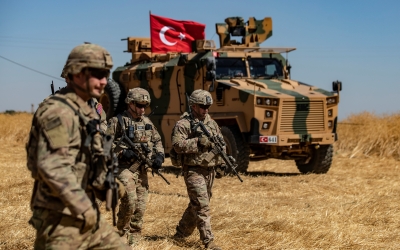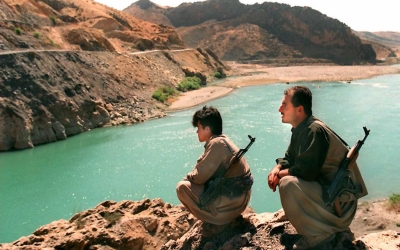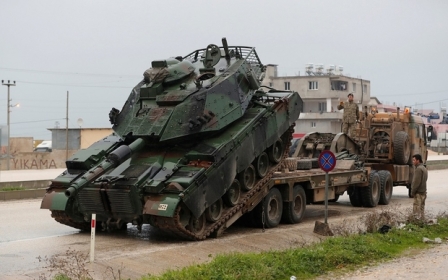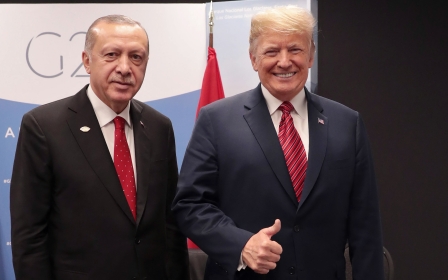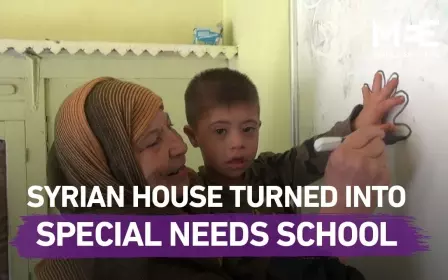For Idlib's residents, Turkey's looming offensive throws future into doubt
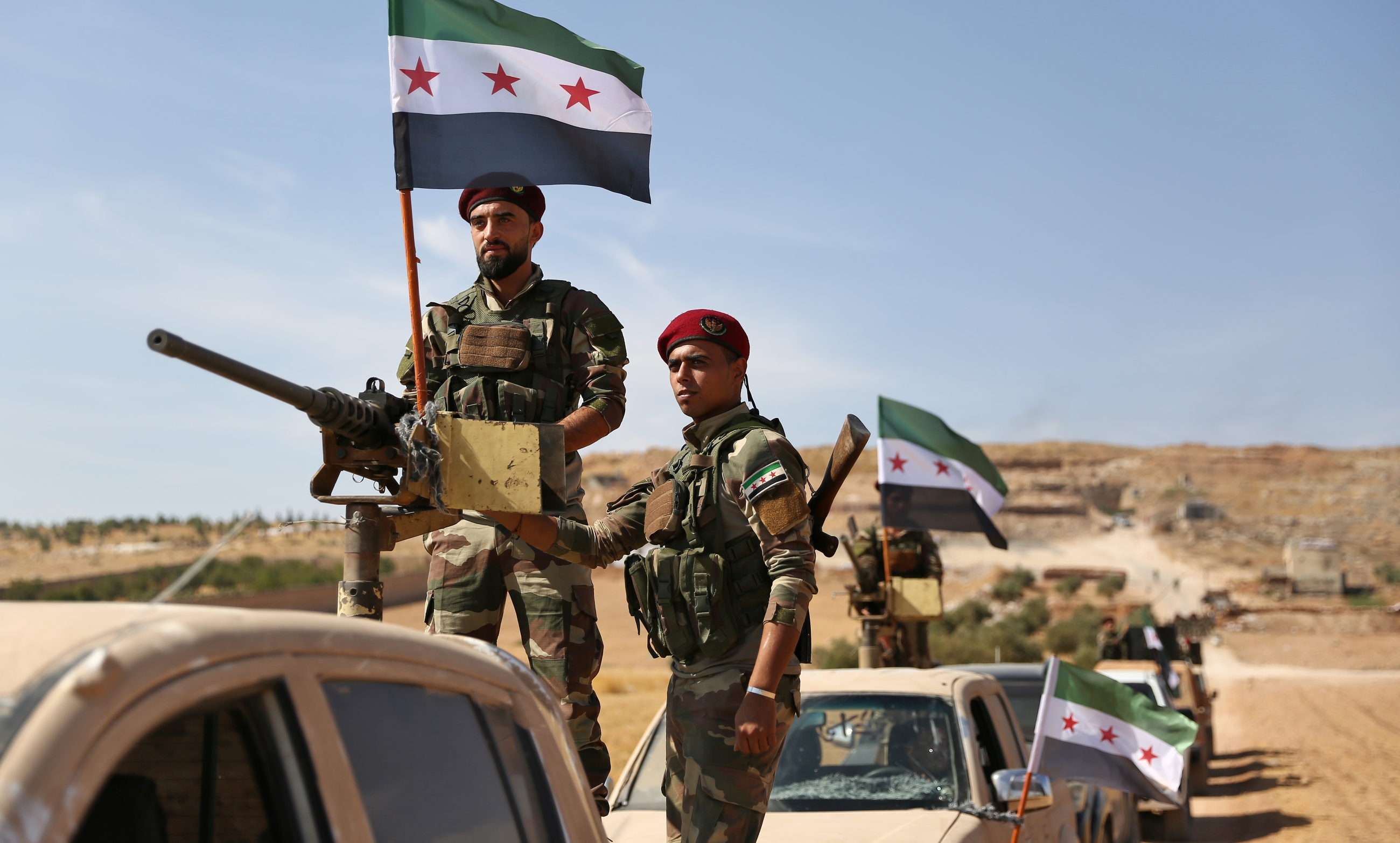
The fate of Idlib province looms large in the minds of residents of the last opposition-held enclave in Syria, as Turkey prepares an offensive to clear Kurdish-controlled areas in northeast Syria.
The Turkish government on Monday submitted a note to parliament to extend Turkish military operations outside the country's borders.
The move followed the United States' announcement that it was evacuating its troops from military bases near the Turkish border, thereby abandoning their erstwhile Kurdish allies who had fought against the Islamic State (IS) group in eastern Syria.
While some activists see a Turkish offensive as a way for Syrian rebels to spread their control in the north, others fear a redeployment of fighters away from Idlib puts the opposition stronghold in danger of getting captured by Syrian government forces.
Ensuring the future
For Ibrahim al-Daghaim, an activist based in the town of Jarjanaz near Idlib's southern front line, the priority for all the "sons of the revolution" is the unity of Syrian territory, outside the control of forces loyal to Bashar al-Assad.
"The areas east of the Euphrates are usurped by the Kurdish People's Protection Units (YPG) and the local population has been suffering injustice," Daghaim told Middle East Eye.
While Syrian government forces control the northeast cities of Hasakah and Qamishli, surrounding areas are under YPG control. But the front lines between the two sides have been quiet for long periods of time.
"Any additional Turkish military operation inside Syrian territory is a guarantee for the future of rebel areas," Daghaim said.
The activist said his belief was based on Turkey’s previous incursions inside Syria, citing Ankara’s Operation Olive Branch. Then, with the backing of the Turkish army, Syrian rebels captured the city of Afrin from the Syrian Democratic Forces (SDF), which are dominated by the YPG.
“Operation Olive Branch in early 2018 linked the cities of Afrin, Idlib and northern Aleppo," Daghaim said.
"Rebel-held areas must be expanded. With Turkish support, the rebels can, of course, maintain control over Idlib and capture the eastern Euphrates,” an area controlled by the SDF.
The fate of Idlib
However, Abdel Qader al-Shahoud, an activist displaced from Aleppo, fears that the rebels will lose control of some areas south of Idlib in exchange for control in eastern Syria.
"I hope the battle will not lead to an ill-considered influx of rebels from Idlib to the eastern Euphrates, which could leave Idlib weak and unprotected," Shahoud told MEE.
Syrian opposition fighters, including militants and rebels, have been fighting since earlier this year to fend off an offensive by pro-government forces to retake the last rebel-held part of the country.
'We fear we will lose parts of Idlib'
- Alaa al-Jisri, Idlib resident
A unilateral ceasefire in the area announced by Moscow and Damascus in late August eased months of fierce bombing on Idlib.
Shahoud fears a repeat of the “Aleppo scenario” when the Syrian government launched an offensive to capture the then rebel-held eastern part of the city, while Turkey-backed Free Syrian Army rebels were knee-deep in Ankara’s Operation Euphrates Shield further north.
"The battle in eastern Syria is a strategy for the rebels and it intersects the interests of [foreign] states in Syria," Shahoud said.
Alaa al-Jisri, an engineer based in the south of Idlib, agrees on the importance of the battle, which is reinforced by what he sees as “an intersection between the interests of the rebels and those of Turkey in the eastern Euphrates".
"In general, I don't think America will cede parts of eastern Syria in exchange for Russia acquiring areas in Idlib province, yet the fears are great. We fear we will lose parts of Idlib," he said.
United States forces evacuated their military bases from the Syrian border on Monday as US President Donald Trump announced that his country would stand aside as Ankara launches its "long-planned" operation.
In late August, Syrian government forces backed by Russia took control of the strategic town of Khan Sheikhoun, south of Idlib, and surrounding cities, and captured villages north of Hama after heavy fighting and attacks.
"I think that the steadfastness in Idlib and the recapture of areas recently seized by the Syrian regime south of Idlib are more important than the battle in eastern Syria," Jisri said.
"But the battle is a Turkish decision, not a Syrian one, although the rebels have a great interest in the villages east of the Euphrates, from which the YPG must be expelled."
'I can't go back'
Turkey’s stated aim is to secure its territories from attacks by the YPG, which it accuses of being a terrorist organisation with links to the outlawed Kurdistan Workers' Party (PKK). Ankara has also said it wants to create so-called "safe zones" in northern Syria where it can send back Syrian refugees currently living in Turkey.
However, Abu Hassan, a refugee from Eastern Ghouta, said he prefers to stay in Turkey rather than live in the opposition-held city of Afrin with Turkish support or going to areas east of the Euphrates if they were recaptured by rebels.
"When I left for northern Syria [after fleeing Eastern Ghouta], I stayed in Afrin, which was safe and quiet," he told MEE, using a pseudonym for security reasons. "But the city became unbearable because of clashes between the rebels, as well as indiscriminate bombings by YPG cells."
“I don't think I'll go back to Syria if the areas east of the Euphrates become safe under rebel control. I'm from Eastern Ghouta and I hope the Syrian regime falls so I can go home."
Middle East Eye propose une couverture et une analyse indépendantes et incomparables du Moyen-Orient, de l’Afrique du Nord et d’autres régions du monde. Pour en savoir plus sur la reprise de ce contenu et les frais qui s’appliquent, veuillez remplir ce formulaire [en anglais]. Pour en savoir plus sur MEE, cliquez ici [en anglais].


